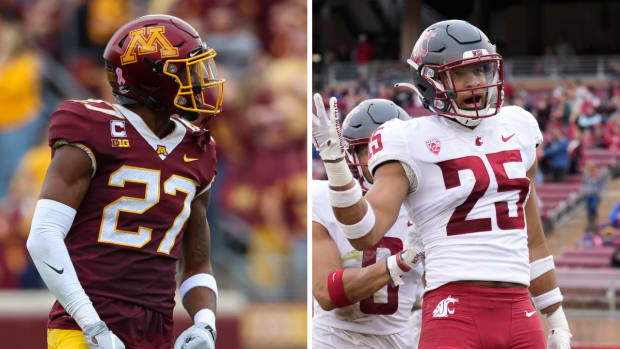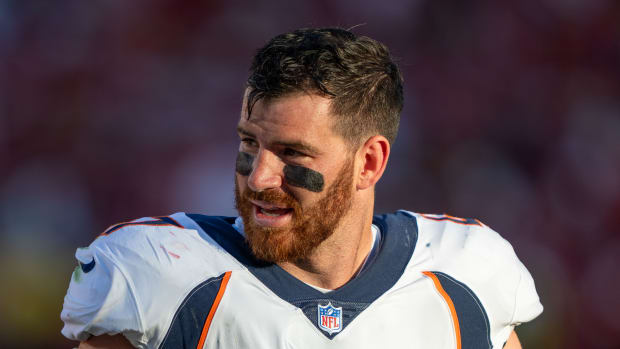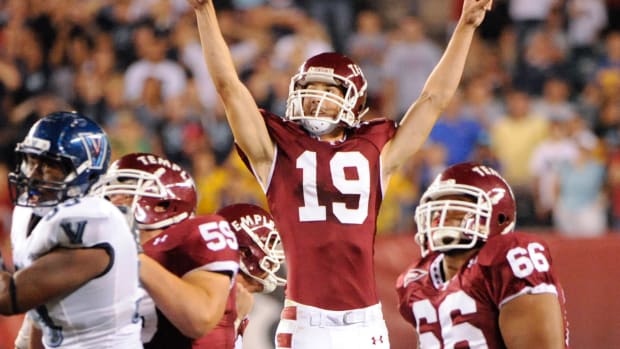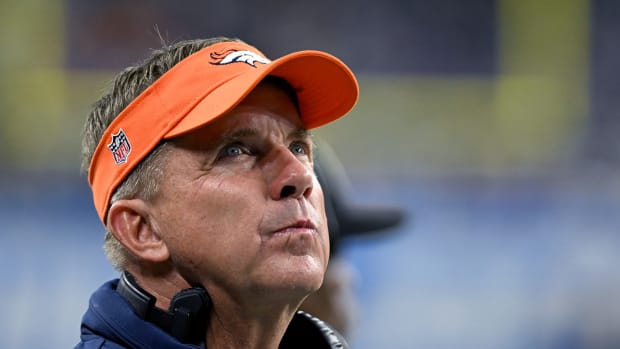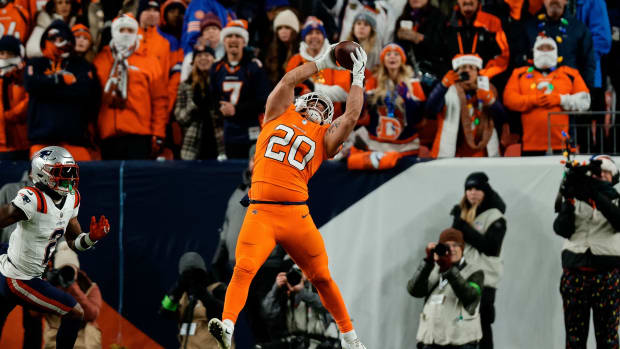Chiefs' Pre-Mahomes Era Offers Fangio the Model to Succeed with Teddy Bridgewater
When George Paton took over as the Denver Broncos' general manager, one of the first questions many fans asked was: "What does he think about the quarterback situation?"
This came in the same offseason in which it was quarterbacks were a hotter topic of discussion around the NFL than they had been in some time. You had top veterans who reportedly wanted to be traded, former first-round picks being dealt to other teams, and a quarterback draft class with five players touted as worthy of a first-round pick (and all five were taken in the first round).
This led to spirited, even divisive, discussion among Broncos fans about the quarterback situation. You had those who championed Drew Lock after he showed big-play capability but had important flaws with his play, and then there were those who pushed for Denver drafting a quarterback, getting excited when Ohio State's Justin Fields fell down the board (only for the Broncos to pass him up).
Others pushed for the Broncos to acquire a veteran QB in trade, whether he was clearly available or not. In the end, the Broncos did trade for a veteran, but went with Teddy Bridgewater — who ultimately won the starting QB job for 2021.
Some have compared Bridgewater to former San Francisco and Kansas City QB Alex Smith. One could make the joke that if the term "average QB" appeared in a dictionary, you'd find a picture of Smith.
If that is the comparison we wish to make, then we have to go back and look at what Smith's teams were able to accomplish with him — and how this ties back to Bridgewater and the one factor that's really going to determine how well he performs: Coaching.
The Chiefs: Life Before Smith
The Chiefs currently have Patrick Mahomes, considered the best quarterback in the NFL. It's easy to compare Mahomes to Smith and say how much better the Chiefs are for it.
However, the Chiefs were not in quarterback purgatory when Smith was the man under center. That QB purgatory came in the years before Smith joined the Chiefs.
Those years would be 2007-12, after Trent Green — who spent six seasons with the Chiefs — had missed eight games in 2006 with injuries and was traded to the Dolphins in June of 2007. Green had some success as the starter, though he never proved to be elite.
But after Green was traded, the Chiefs went through seven different quarterbacks in the next six seasons. That's comparable to the Broncos' QB situation from 2016-20 in which the team went through nine different signal-callers the past five seasons.
Perhaps the most notable name is Matt Cassel. In 2010, he started 15 games for the Chiefs, winning 10 of those games and making the playoffs. However, Kansas City won just four of his 15 starts in 2009, and he missed seven games in each of the ensuing two seasons, with five wins to show for it.
The rest of the QBs that followed failed to impress. The Chiefs started Damon Huard, Tyler Thigpen, and Brodie Coyle prior to Cassel's arrival. When Cassel missed starts, the Chiefs had to rely on Kyle Orton, Brady Quinn, and Tyler Palko — the former two of whom had been with the Broncos previously before being cast off, and the latter being a name that probably elicits this reaction from you: "Who?"
In other words, before the Smith era, Kansas City was the very definition of QB purgatory, with the only saving grace being a 10-win season with a single playoff trip in 2010.
The Chiefs: Life With Smith
In 2013, the Chiefs went another direction, which included naming John Dorsey general manager and Andy Reid head coach. The Chiefs had the No. 1 overall pick in the draft, but the class at the time didn't have a lot of appealing QB prospects. Also, there wasn't much in the way of free agent QBs.
The Chiefs thus opted to deal draft picks to San Francisco for Smith, who had spent much of his career with the 49ers and, in 2011, had his best season as a pro under the guidance of then-head coach Jim Harbaugh, which included the team almost making it to the Super Bowl that year.
Some people raised their eyebrows at the idea of Smith under Reid, wondering if he was a good fit for Reid's offensive scheme.
During the 2013 season, the Chiefs relied more on running back Jamaal Charles. Their third-round pick that year, tight end Travis Kelce, didn't play because of injuries, and their best receiver was Dwayne Bowe, who excelled as a depth threat and, thus, wasn't the kind of receiver you'd expect to thrive with Smith under center.
Despite that, the Chiefs put together an 11-5 record and made the playoffs, with Smith starting 15 of those games (KC rested its starters the final week). The defense ranked 11th overall in Football Outsiders DVOA at -5.1 percent — a sign of a good-but-not-great defense. (The offense was 15th at 3.1% DVOA.)
In the next four seasons, the Chiefs had a winning record each time and made the playoffs in three of those seasons. Though Kansas City didn't win the division until after Peyton Manning retired and the Broncos started looking for a new QB, the Chiefs were a consistent playoff threat under Reid, despite Smith being no more than average.
I won't go over DVOA too much, but I will say that, in analyzing it, the defense wasn't carrying the Chiefs like people may have thought. In fact, in Smith's final season with the Chiefs in 2017, the offense ranked fourth in DVOA (16.4%) while the defense ranked 29th (10.8%).
In other words, Reid proved he could get a team to the playoffs with an average quarterback and get good production on offense.
The Chiefs: Life After Smith
I'll be brief here, but what's important to note is that it wasn't until 2017 that the Chiefs targeted their next QB — of course, that's Mahomes.
The Chiefs arguably weren't in position to pursue top QB prospects from 2013-16 — and even then, they weren't always filled with top guys. However, one might argue that the Chiefs could have taken a chance on Dak Prescott when he fell into the third round, instead of settling for Kevin Hogan in the fifth.
However, the Chiefs did make the move up the draft board in 2017 for Mahomes, a year in which they entered the draft with eight total picks and, later, traded up in the third round to draft running back Kareem Hunt.
Mahomes took over in 2018 and we know the rest of the story. The bottom line, though, is it took time for the Chiefs to find an elite QB, but once they saw the guy they loved, they made the move to get him, regardless of their draft pick count.
What It Means for Fangio & Bridgewater
Vic Fangio enters his third season as a head coach. Unlike Reid, who entered his first year as Chiefs head coach in 2013 and promptly acquired Smith, Fangio will not get multiple years to prove himself. He'll have to win at least 10 games this year to get it done.
But if Fangio is suited to be a head coach, and if Pat Shurmur is the right choice for offensive coordinator, the Broncos should be able to win at least 10 games with a talented roster and an average QB, especially if Reid could win 11 games with an 'average' QB on a team that was entering year one of a rebuild.
Say what you want about Bridgewater as a passer, and like Smith, he may not be elite, but he has talent and the ability to lead a team. If Fangio and Shurmur are the guys to be heading up the Broncos and the offense, it should be reflected in the team being able to win with Bridgewater.
If Fangio and company prove they can win with Teddy, that leaves the option open for Bridgewater to stick around unless the Broncos find themselves able to land an upgrade veteran in trade. The vets who didn't get traded this year might wind up being on the block in 2022 if teams believe their hands are forced.
If Bridgewater does stay, and the Broncos keep winning with him, who should be complaining? Answer: Nobody. Broncos fans want wins and playoff trips.
Sure, a Super Bowl would be great, but wins and playoff trips are what give you that chance and, while the Super Bowl is the ultimate goal, the playoffs are the first goal.
What about drafting a quarterback, then? Regardless of what happens with Bridgewater, you just never know when Paton may decide he sees his guy and does exactly what the Chiefs did.
While the 2021 draft class had plenty of talented QBs, and 2022 may not look as good, that doesn't mean the Broncos are screwed for life. For all we know, Paton may have his eyes on the 2023 draft class, which may have better prospects.
We also don't know yet what other teams may be thinking when it comes to 2022. Sure, the Broncos could wait until 2023, but will a team like the Houston Texans or Detroit Lions going to keep rolling with a less-than-ideal veteran option at QB in 2022? Or might they decide that their guy actually is in the 2022 class?
You just never know what teams are going to decide in the future with regards to a QB class — or how classes more than a year down the road will shape up. And while Paton passed on Fields and Mac Jones, he wasn't the only one. The Lions could have taken Fields if they wanted, even if they still had to pay Jared Goff for the next two seasons.
Bottom Line
But back to the point about Fangio: If he is the man to coach the Broncos beyond 2021, he should be able to win with Bridgewater. Get 10 or more wins and the job is done — and you might even have the QB you can continue winning with, at least until Paton and company identify "their guy" in a future NFL draft.
Reid showed he could win with a QB who was no more than average. Fangio, thus, must show he can do the same.
And if he does, it doesn't mean the Broncos have to stick with Bridgewater until Fangio is gone. After all, there's no telling when the Broncos might land a QB who could do even better. Just ask Reid and the Chiefs.
Follow Bob on Twitter @BobMorrisSports.
Follow Mile High Huddle on Twitter and Facebook.
Subscribe to Mile High Huddle on YouTube for daily Broncos live-stream podcasts!
